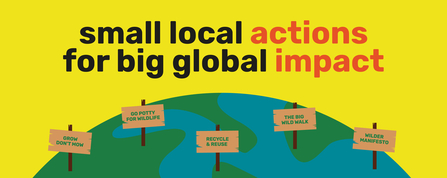Each action may be small, but together these wild activities can make a difference and encourage others to join in, which leads to a bigger impact.
Derbyshire Wildlife Trust are calling for all residents, businesses and leaders from Bamford to Buxton; Matlock to Derby to share five key actions to take now.
1. Grab a pot and plant away by taking part in #gopotty for wildlife
2. Lock away your mower and join in with #growdontmow
3. Call for local councils to commit to our Nature Recovery Motion
4. Go on a Big Wild Walk for nature and get sponsored to raise vital funds to help wildlife
5. Reuse, reduce, recycle with our charity shops

